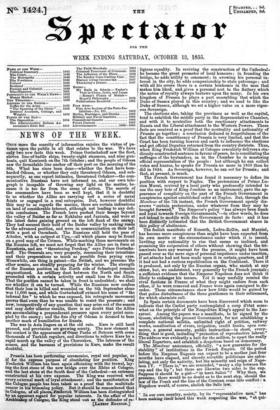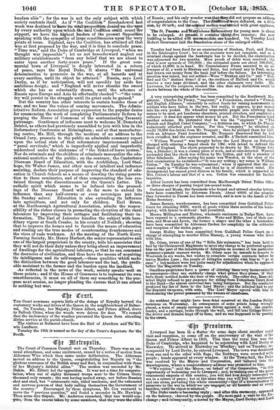In our own country, society, by its "representative men," has
been making itself heard this week respecting the war, "et qui- In our own country, society, by its "representative men," has been making itself heard this week respecting the war, "et qui-
busdam aliis " ; for the war is not the only subject with which society contents itself. As if " the Coalition " foreshadowed last week was destined tollanseits vitalfpropositiob-deniest-Virlhubt by every authority nponswhich the said Coalition °Mild countIfer support, we have the highest leaders of the present Opposition speaking with the sympathy of large. constituencies npon-the ',very points at issue. England, says the Coalition, has attained all that was at first proposed by the war, and it is time to conclude peace. "Time was," said the Duke of Cambridge at Liverpool, "when we thought war impossible"; let us not henceforward neglect our military establishments "from any belief that we are about to enter upon another forty-years peace." If the great com- mercial to of Liverpool is deeply 'interested in a return of peace, says the Royal -Duke, 'it -shades "'the universal determination to persevere in the war, at all hazards and at -every sacrifice, until its object be attained." Russia, says Lord Derby, as if by anticipation, will not speedily lay aside her ambitious design ; and "England will never sheathe the sword 'which she has so relaotantly drawn, until 'the schemes of Russia upon Europe and Asia be effectually checked "—"the coun- try will persist in the struggle until its great ends be gained." Bat the country has other interests to sustain-besides those of war, and we hear the voices of coming movements. The -Admin- istrative Reform Association gives expression to the popular desire for oommencing the work of completing Parliamentary Reform by purging the House of Commons of the contaminating Treasury patronage. Gentlemen of influence meet to welcome M.'Demetz at Bristol, as others had previously assembled to join with him in the Reformatory Conference at Birmingham ; and at that manufactur- ing centre, Mr. Hill, through, the medium of an address to the Grand Jury, presents to the public an admirable summary report upon the actual state of that reformatory imprisonment called "penal servitude," which is imperfectly applied and imperfectly understood under the nickname of " the ticket-of-leave system." Nor do criminals and the children of criminals monopolize the edu- cational anxieties of the public ; on the contrary, the Canterbury Diocesan ,Board of Education, with the Archbishop, 'Lord -Stan- hope, Sir Walter James, and other men of intellect and influence assisting, declare their purpose of improving the Standard of edu- cation in Church Schools as a means of drawing the rising genera- tion to those seminaries, and of thus compensating the •loss sus- tained through the discontinuance of the Queen's Letter. The catholic spirit which seems to be infused into the proceed- tigs of the Diocesan Board -will do far more to extend its time than any half-crowns or even sovereigns put into the Sunday salver. Education is also extending its influence -into agriculture, and not only for children. Earl 'Bruce, st the Marlborough Agricultural Association, admits the respon- sibility of the richer classes in promoting the elevation of the rural labourers by improving their cottages and facilitating their in- formation. The Earl of Leicester handles the subject with-here- ditary vigour at South Creake, in his county of Norfolk ; showing that to improve the homes and to furnish the means of education and reading are the' true modes of counteracting drunkenness-and the vices of rude workmen. -At the meeting of the North Kerry Farming Society, Mr. Henry Herbert, the senior representative and one of the largest proprietors in the county, tells his associates that they will not do their duty 'unless they bring about an improvement of dwellings for the agricultural labourer, so that'he can command the decencies of civilization, and thus have the means of acquiring its intelligence and its 'self-respect,—those qualities whieh make the distinction between the good labourer'and the bad, the prOfit- able assistant to the farmer and the burden upon the landlord.
As reflected in the news of the week, society speaks 'well on these points ; and if the Rouse of Commons is to represent its own .nonstttnencies, it must on all of them say something to the par- pose next session, no longer pleading the excuse that it can attend • to nothing but war.



























